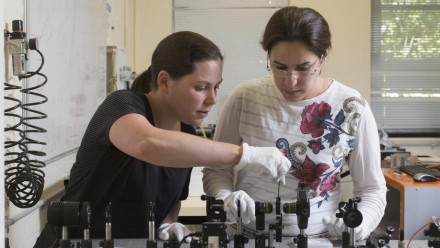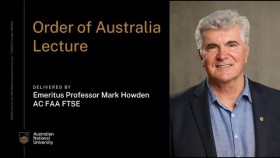Inspiring energy: Profile of Dr Fiona Beck
THIS ARTICLE ORIGINALLY APPEARED IN ANU REPORTER.
Dr Fiona Beck, PhD ’11, one of Australia’s most promising early career researchers, hopes to influence the next generation of optoelectronic technologies. Rebecca McKenzie-McHarg reports.
Dr Fiona Beck is working on a new way to detect and convert light at the nanoscale.
Her interest in light and how it can be harnessed stems directly from her childhood in Botswana. She was raised in a rural area, Notwane, and travelled to the capital city Gaborone for school each day.
She distinctly remembers the morning commute across the flat sunlit landscape before crossing a concrete flyover.
Along the edge of the flyover was an old warehouse that held her gaze. The words ‘Solar Power’ stood out. She admits she had no idea what the company did, however it was enough to spark an attraction to science and technology at a very early age.
She can identify the pivotal ‘ah-ha’ moment that set her focus. “I was given a copy of 50 simple things you can do to save the earth when I was about 10 years old,” she says.
“The book listed all the environmental challenges facing the world, including the link between carbon pollution from fossil fuels and global warming. Even as a young child I have a clear memory of being really alarmed by it.
“Botswana has a ridiculous number of sunny days each year, so the idea that we could use a solar power technology to solve these big problems seemed so logical. It felt like a no brainer to me as a child – this is what we needed to do.”
As Beck mentions the environment, it’s hard not to compare the similarities between Botswana and Australia. With a climate similar to the Northern Territory, the country is often drought-ravaged and could be Australia’s little sibling ‘Sunburnt Country’.
She is quick to clarify that, despite the arid environment, there is so much natural beauty to be seen. She speaks with deep affection about Botswana, a country with progressive social policies, and one of the most stable economies in Africa – a sun-drenched country she credits with inspiring her research.
During high school she was fascinated by physics and science. In 2006 she completed a Master in Physics majoring in solid state physics at the University of Glasgow, before arriving at ANU to complete her PhD in Nanophotonics for solar energy applications.
During this time she was mentored by two of Australia’s most prominent photovoltaic researchers, Professor Andrew Blakers and Professor Kylie Catchpole.
She met her husband who was also studying at ANU. “It was tough when we finished our PhDs and we had to decide where we were going to go next,” she says.
“It’s a very common problem in academia when two people are pursuing careers. It is usually necessary to travel internationally to find the best research opportunities.
I was really lucky that my husband was so supportive and followed me to my postdoctoral position at the Institute of Photonic Science in Spain.”
Subsequently, her husband also accepted a postdoctoral position in Spain and they both gained insights and perspective that have shaped their knowledge and skills today.
With an area of focus that spans almost two decades, and reaches from north to south across the globe, Beck returned to ANU in 2015 to accept a Future Engineering Research Leader (FERL) Fellowship.
In 2017 she won a prestigious Discovery Early Career Research Award from the Australian Research Council for her project ‘Plasmonic hot-electron technologies for nanoscale energy conversion’. This award will allow her to accelerate her research, which aims to introduce a new way to detect and convert light at the nanoscale, and inspire a new generation of renewable energy, sensing and imaging technologies.
Beck is well-placed to make significant advancements in this field. Her novel approach is expected to inspire a suite of applications across biomedicine, optical computing, photochemistry and more.
“While the physics behind hot-electron technology has been around for a long time, no one has been able to develop the technology to the point where it can deliver useful devices,” she says.
“What makes this technology so appealing is the ability to engineer the way it responds to light – it can be designed to be very selective to the illumination it absorbs (i.e. the wavelength, polarisability or bandwidth) or conversely absorb a large fraction of the light from the sun.
“If we can advance this technology, it can be used for applications that standard silicon technologies are not suited to, and avoids the need for expensive, hard-to-fabricate or toxic materials,” she says.
The successful completion of Beck’s research is expected to influence a number of applications of national and international importance, such as advances in solar hydrogen production.
It’s only now we can truly appreciate how Botswana has inspired her curiosity with light, a vast resource so prominently featured from her earliest days.











